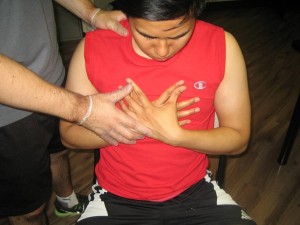Chronic obstructive pulmonary disease (COPD) is a group of progressive lung conditions such as chronic bronchitis and emphysema.
Emphysema steadily impairs the air sacs in the lungs which disrupts outward air flow. As for bronchitis, it results to inflammation and constriction of the bronchial tubes which allows the buildup of mucus.
The condition can cause difficulty breathing where the symptoms are initially mild and starts with shortness of breath and coughing. Once it progresses, it becomes increasingly hard to breathe.
COPD is mainly caused by smoking. Prolonged exposure to chemical irritants can also lead to the condition.
What are the signs?
Initially, the signs of chronic obstructive pulmonary disease are mild.

Some of the initial signs include:
- Occasional shortness of breath, especially after physical activity
- Mild but recurrent cough
- Urge to clear the throat often, especially upon waking up in the morning
Once the lungs are progressively damaged, the following might be present:
- Shortness of breath even after mild exertion such as climbing up the stairs
- Chest tightness
- Wheezing
- Chronic cough with or without mucus
- Lack of energy
- Urge to clear mucus from the lungs daily
- Frequent flu, colds or other respiratory infections
Management of chronic obstructive pulmonary disease
The treatment for COPD can ease the symptoms, prevent complications and slow down the progression of the disease.
Medications
Bronchodilators are given which work by relaxing the airway muscles to promote better breathing. They are typically taken via an inhaler. In some cases, glucocorticosteroids are added to lessen the inflammation in the airways.
Oxygen therapy
If the blood oxygen levels are low, oxygen is given via a mask or nasal prongs to allow better breathing.
Surgery
Surgical intervention is reserved for severe cases of chronic obstructive pulmonary disease or if other treatment options fail to work.
Lifestyle modifications
Some lifestyle changes can also lessen the symptoms or provide relief such as:
- Limit or cessation of smoking
- Avoid exposure to secondhand smoke and chemical fumes
- Healthy diet
- Exercise which is based on the suggestion by the doctor
More Information / Disclaimer
The information posted on this page on chronic obstructive pulmonary disease is for learning purposes only. Learn how it is treated by taking a standard first aid course with Toronto First Aid.
